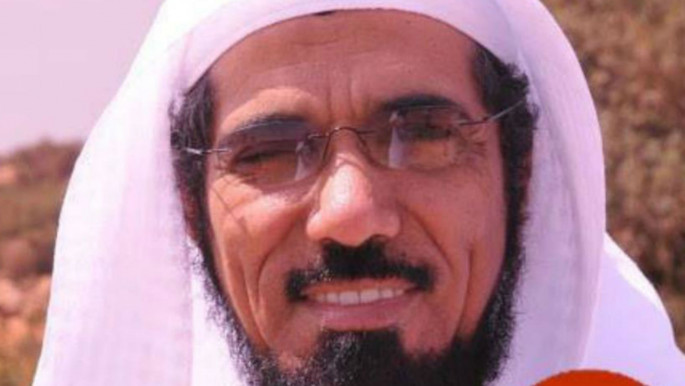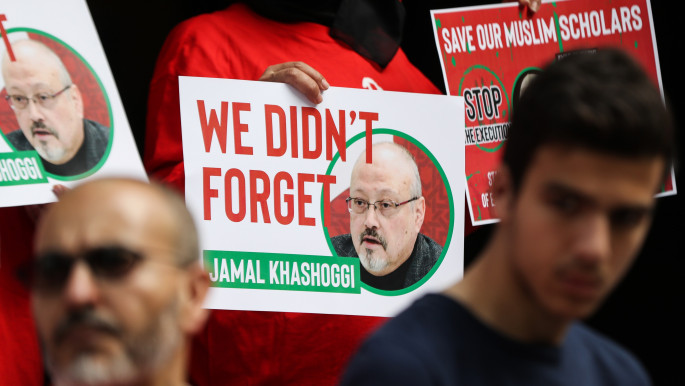
Breadcrumb
Currently, Awdah, Qarni, and Omari are charged with terrorism and awaiting trial at the kingdom's Criminal Special Court in Riyadh.
The arrest of these three "moderate" clerics in September 2017 triggered a chorus of condemnation from abroad, including from the United Nations and numerous human rights organizations like Human Rights Watch and Amnesty International.
Their detention occurred two months before the Ritz Carlton saga in which Crown Prince Mohammed bin Salman (MbS) ordered the arrest of scores of wealthy and prominent Saudi royals, merchants, and billionaire moguls during the infamous "anti-corruption drive."
Adwah, Qarni, and Omari have been tied to the Muslim Brotherhood-inspired Sahwa movement. Since the crown prince's ascendancy, his fears of revolutionary activism in the region spreading into Saudi Arabia have prompted the authorities in Riyadh to wage a campaign of repression against Sahwa-affiliated Islamists in the kingdom.
From MbS' perspective, the potential for the movement to compete with him for power while operating outside of his control represents an unacceptable threat not only to the Saudi monarchy's Islamic legitimacy but also to its survival.
Awdah was punished for tweeting that he hoped for a resolution to the Qatar crisis shortly after MbS had a telephone conversation with the emir of Qatar on September 8, 2017. This cleric spent half of the 1990s behind bars because he advocated political change in the kingdom.
Awdah has delivered hundreds of lectures and produced hundreds of articles that mainly address Islamic law. He is known for promoting "moderate" and "democratic" values. Awdah is the assistant secretary-general of the International Union of Muslim Scholars (IUMS), a Qatar-based institution understood to be affiliated with the Muslim Brotherhood, which the Saudi government recognises as a terrorist entity. The kingdom's public prosecutor has leveled 37 charges against him.
 |
|
| Salman al-Awdah was arrested after tweeting about the Gulf crisis [Twitter] |
Qarni also landed in trouble after pushing for a rapprochement between Riyadh and Doha. He is a preacher, academic, and author who had 2.2 million Twitter followers at the time of his arrest. Omari, a popular broadcaster who has enjoyed much popularity with younger Saudis, has earned a reputation for being relatively progressive on gender issues and for condemning violent extremism. Omari has also been a member of the IUMS. Following his arrest, Saudi Arabia’s public prosecutor charged Omari with "forming a youth organization to carry out the objectives of a terrorist group inside the kingdom" along with at least 29 other crimes, recommending capital punishment.
These executions would further demonstrate that MbS is ignoring outside pressure regarding the kingdom’s record on human rights. The execution of 37 (mostly Shia) Saudi citizens in April was arguably about testing the waters to see how the international community, especially the United States, would respond. Considering the lack of any significant pressure on Saudi leadership from the White House throughout the Jamal Khashoggi affair, MbS likely feels emboldened to take actions without fearing any consequence in terms of a backlash from the Trump administration.
If Awdah, Qarni, and/or Omari receive the death penalty, their executions could only reinforce this notion that America’s current leadership is indifferent to Riyadh's human rights record or the Saudi government’s targeting of dissidents abroad, such as Iyad el-Baghdadi in Norway.
 |
These executions would further demonstrate that MbS is ignoring outside pressure regarding the kingdom’s record on human rights |  |
There are important geopolitical dimensions to these three scholars’ files. Odah, Qarni, and Omari are not dissidents or revolutionaries. None of them called for the royal family to step down from power. For most of their careers, they avoided criticizing Al Saud royals. Yet when MbS began changing Saudi conduct on the international stage in major ways, the crown prince did not receive their support. Given that all three expressed sympathy for Qatar, or at least support for a Saudi-Qatari rapprochement, their executions would be strong evidence of Riyadh’s refusal to soften its tone when it comes to Doha.
 |
|
| Jamal Khashoggi was killed in the Saudi consulate in Istanbul [Anadolu] |
The fate of these three Islamic scholars will likely have major ramifications for Saudi-Turkey relations too. On May 27, Yeni Safak published an open letter to King Salman written by Yasin Aktay, an advisor to Turkish President Recep Tayyip Erdogan. Aktay warned the Saudi monarch against executing Odah, Qarni, and Omari. In his words: “That which will bring disaster to you is executing Islamic scholars, which was recently announced. Scholars are the inheritors of prophets, and each scholar is a world on their own. The death of a scholar is like the death of the world. The killing of a scholar is like the killing of the world.”
Erdogan's advisor also argued that the fate of these three Saudi scholars is not merely a domestic issue for Saudi Arabia. "The matter of Islamic scholars is not an internal affair. The scholars in question are assets who are acknowledged and revered by the whole Muslim community. They are not your subjects; they are our common treasures, whose advice we heed, and who are beacons of light with their knowledge and stance. The sin of detaining them even an hour in the dungeon, let alone executing them, is enough to destroy an entire life."
Aktay called on King Salman to use his country's riches to alleviate problems across the Islamic world and to support Turkey’s quest to pursue justice in the case of Jamal Khashoggi, assassinated by Saudi agents in Istanbul last year.
The advisor’s letter displayed respect to King Salman but did not addressing MbS. Erdogan’s circle is attempting to make distinctions between King Salman and MbS, for instance by emphasizing early in the Khashoggi case that King Salman was not implicated or when Erdogan exchanged Eid greetings with King Salman in June. By asking King Salman to spare Awdah, Qarni, and Omari from executions, Erdogan is attempting to use his relationship with the Saudi monarch to prevent what many in the Sunni Muslim world consider a major injustice.
 |
The matter of Islamic scholars is not an internal affair. The scholars in question are assets who are acknowledged and revered by the whole Muslim community |  |
Turkey may want to buy more goodwill from the Saudi king at a time when Saudi media outlets are calling for a boycott of Turkish goods. Nervous about how Saudi Arabia could hurt Turkey economically by pulling out its investments from the country, officials in Ankara are keen to prevent a further deterioration of bilateral ties that could severely harm Turkey financially. If King Salman intervenes to spare these three Islamic scholars from the death penalty, such a development could possibly reduce tensions in the kingdom’s relationship with Turkey. If not, Ankara and Riyadh could see a sharp increase in friction.
Kristian Coates Ulrichsen PhD is the Baker Institute fellow for the Middle East.
He is a visiting fellow at the London School of Economics Middle East Centre and an associate fellow at Chatham House in the United Kingdom.
Follow him on Twitter at @Dr_Ulrichsen.
Giorgio Cafiero is the CEO of Gulf State Analytics, a Washington, DC-based geopolitical risk consultancy.
Follow him on Twitter: @GiorgioCafiero
This article was originally published by our friends at Lobelog.
Opinions expressed in this article remain those of the author and do not necessarily represent those of The New Arab, its editorial board or staff.